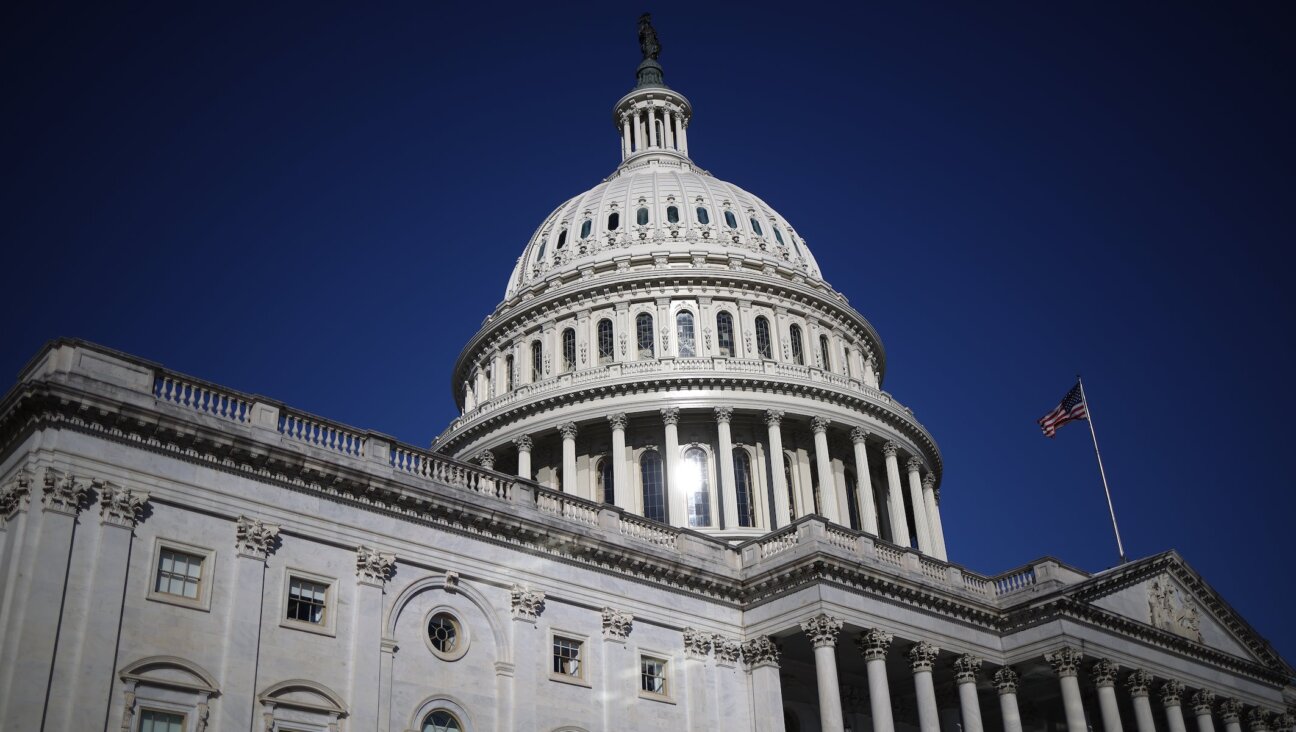Jewish Berkeley students are confronting pro-Palestinian protesters. Their professor is staging a sit-in instead.
The administration has taken advantage of Jewish and pro-Israel students’ unwillingness to retaliate when pro-Palestinian protesters harass them, they say
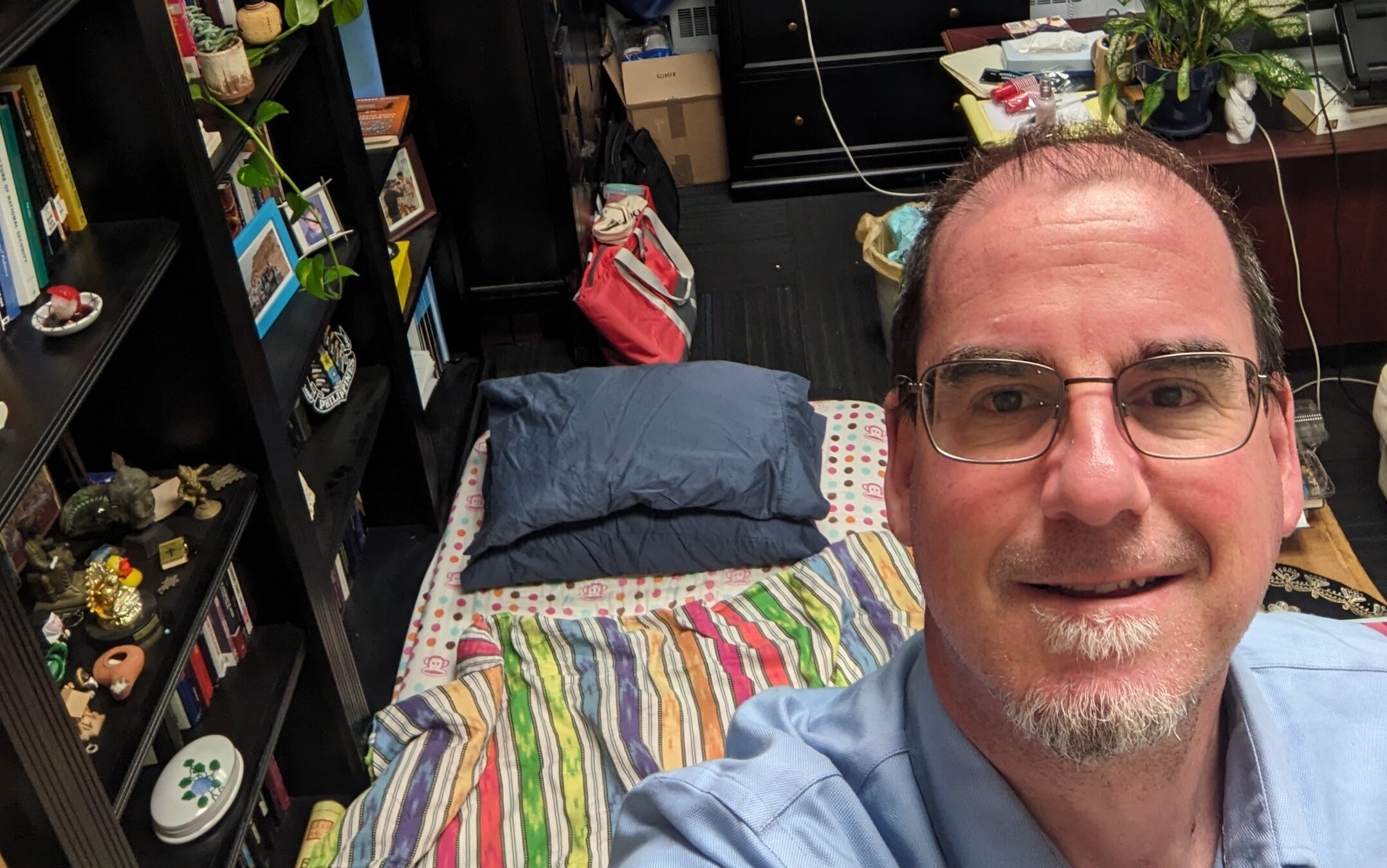
Ron Hassner, chair of the Israel studies program at the University of California, Berkeley, is holding a one-man sit-in in his office to press the university to better address tensions among students heightened by the Israel-Hamas war. (Courtesy Hassner)
(JTA) – Ron Hassner is sleeping on a mattress on the floor. He’s told his students he will be teaching classes only on Zoom. And people keep dropping by with plates of food.
That’s because Hassner, the chair of Israel studies at the University of California, Berkeley, has announced that he will not leave his office until the school does what he believes it should do to keep students safe amid intense protests over the Israel-Hamas war.
His sit-in flips the script on protest at Berkeley, which has been the site of radical political acts and stunts for more than 70 years — nearly always taken on by students. Top university administrators have met with Hassner since he began his protest on Friday, but he says he anticipates remaining in his office for some time, perhaps weeks — and he’s OK with that.
“This has become the happy place, where Jewish students and faculty come to chat with one another and eat together and keep me company and encourage me, because I still smell good,” Hassner told the Jewish Telegraphic Agency on Friday. The big thing he’s missing, he said, is a shower: “It’s going to go downhill real fast.”
Hassner’s humor belies his very serious concern that Berkeley must take swift action “to prevent violence between students.”
Already, last month, a violent mob of pro-Palestinian activists shut down a planned talk by Israel Defense Forces reservist Ran Bar-Yoshafat on campus, breaking windows and reportedly attacking other students. That incident has triggered a federal civil rights investigation, and Berkeley says the school is investigating it as a hate crime.
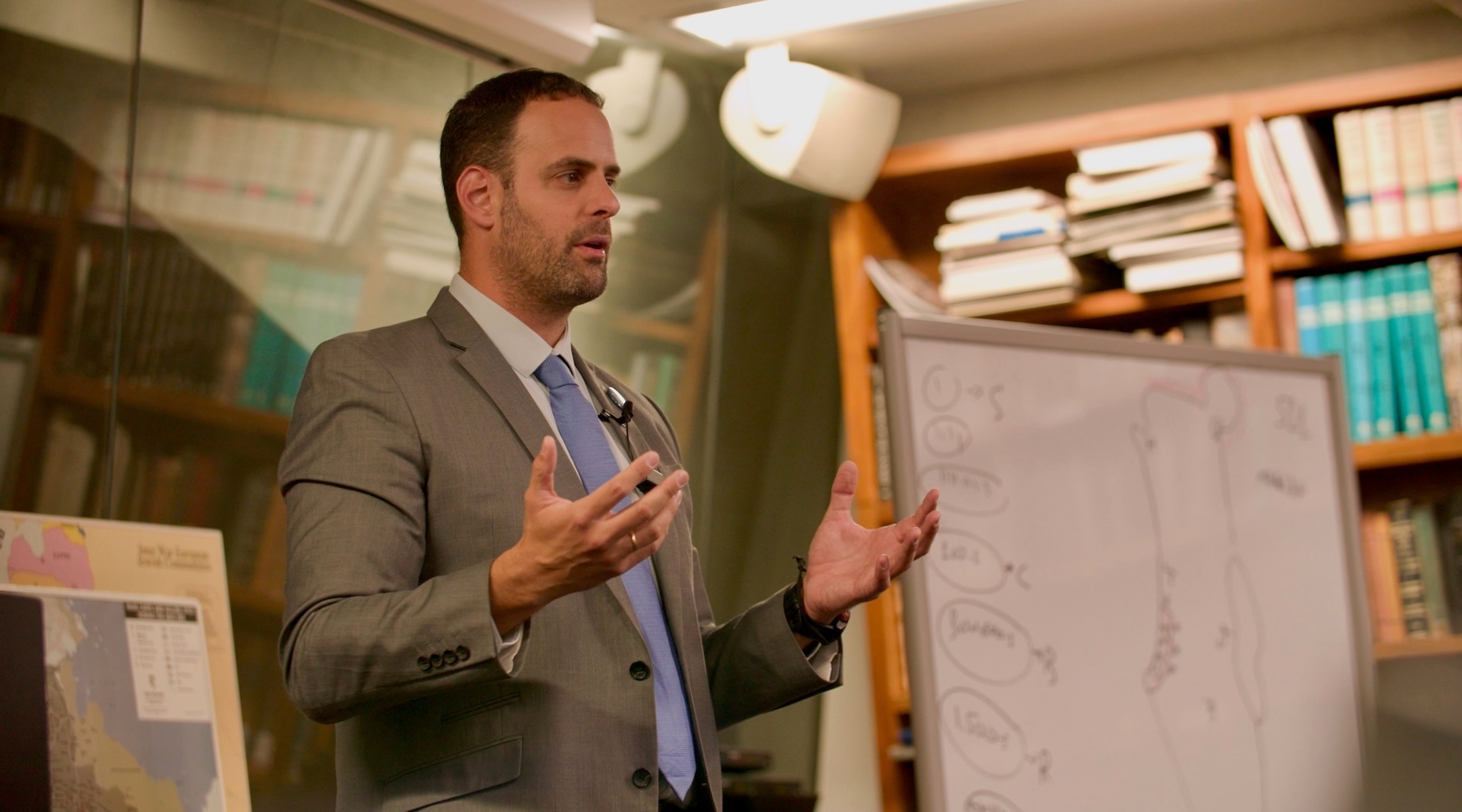
Ran Bar-Yoshafat, whose lecture at the University of California, Berkeley, was canceled amid protests, speaks at Holocaust Museum LA, Feb. 29, 2024, in Los Angeles. (Michael Canon)
Now, a different showdown is brewing, as hundreds of Jewish students and others on campus plan to confront pro-Palestinian protesters at Sather Gate on Monday.
Sather Gate, a central landmark on campus and a site of significance to Berkeley’s Free Speech Movement protests of the 1960s, has been the site of pro-Palestinian demonstration for weeks. According to local reports, students occupying the gate have harassed passers-by with audio purportedly of Israel’s airstrikes in Gaza and filmed some Jewish students without their permission.
The Jewish and pro-Israel students plan to gather first at a local bagel shop (which was vandalized with anti-Israel graffiti over the weekend), then head to the lecture hall where Bar-Yoshafat’s talk was canceled before marching to Sather Gate.
“For too long, the administration’s strategy to manage campus conflict relating to the Middle East has been to rely on the restraint and good behavior of Jewish students,” the Jewish and pro-Israel organizers of “Liberate the Gate” said in a statement. “We will not tolerate this treatment any longer.”
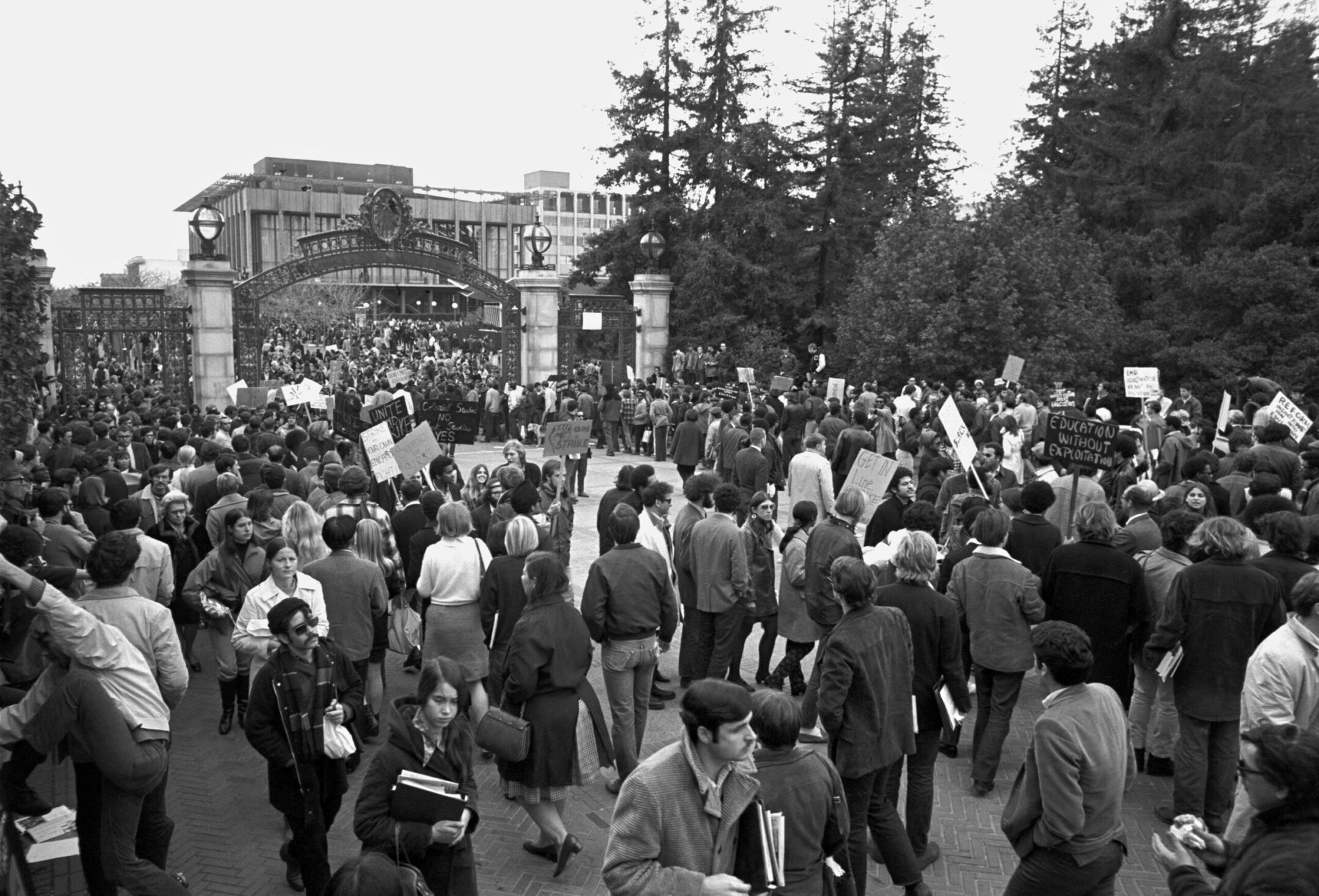
Students demonstrate at Sather Gate on the University of California, Berkeley campus in early 1969 as part of an ultimately successful protest to get the school to establish a minority studies program. (Garth Eliassen/Getty Images)
The rally has support from the local Jewish Community Relations Council, which is bringing in private security.
But Hassner, whose research focuses on religion and war, worries that the plans have turned his campus into a ticking time bomb. Though staunchly pro-Israel and angry that his university has done nothing about the gate protesters, he has publicly pushed for civility on campus since Oct. 7 attack and does not think the counterprotest is a good idea. His sit-in means he cannot join even if he wanted to.
“They said that they would march across campus. I am desperately worried that that march involves a confrontation at the gate,” Hassner said about the Jewish students. “And so I am sorely worried that students will come to blows.”
The organizers say they intend to remain peaceful, and that they have been in touch with campus security to avoid any direct, violent confrontation; they will also be holding nonviolence training before they march.
“Jewish students on campus are deeply committed to a peaceful, non-violent march,” graduate students Daniel Solomon and Hannah Schlacter told JTA in a statement.
“JCRC shares the concerns of Cal students and faculty who feel the University is not doing enough to stand up for Jewish life on campus,” a spokesperson for the organization told JTA. “The march on Monday is about demonstrating Jewish resilience and unity, and is also intended to [send] a strong message to the administration. As always, we urge caution from participants not to engage with provocateurs, and to allow campus police to address any security needs that may arise.”
Hassner believes his protest could be more likely to yield results. He wants three things from the administration: Sather Gate clear of protesters; a letter of apology and a makeup invitation to Bar-Yoshafat as well as anyone else on campus who is “shouted down or mobbed”; and mandatory training to recognize antisemitism and Islamophobia for any student “in a supervisory capacity,” such as resident advisors.
“Many on this campus don’t understand the complex relationship between anti-Israel and antisemitism,” he said.
Research studying the efficacy of protest — and finding that nonviolent protests are consistently more effective than violence — may recommend Hassner’s approach. Social psychologist Eric Schuman was a researcher at Hebrew University in Jerusalem in 2020 when he found that “nonviolent nonnormative” protest — disruptive but nonviolent tactics like strikes, boycotts and sit-ins — “can be an effective means for advancing social change because they are disruptive in a way that generates pressure for political change but also lead people to view the protesters as constructive.”
But whether the university is in a position to deliver quickly on Hassner’s demands remains to be seen.
A spokesperson told JTA that the university is “in contact with both the organizers of the existing protest at Sather Gate and those of the planned counter-protest” and that it hopes to end “aspects of the nonviolent protest at Sather Gate” that violate its policies, while rejecting calls to forcefully remove the protesters: “Use of force against this form of rule breaking frequently results in turmoil and escalation, often to everyone’s detriment.”
The statement also said the school hopes to address “rising tensions on campus” through “dialogue.”
In an updated statement on Sunday, a university spokesperson commented directly on Hassner’s sit-in.
“Insofar as Prof Hassner’s protest is concerned, we wish to share that the university remains committed to fostering an environment conducive to robust free speech and in which all members of its community feel that they may engage in campus life without fear of harassment,” the spokesperson said. “The administration is committed to confronting antisemitism and holds Professor Hassner in great esteem and it is in conversation with him about his concerns.”
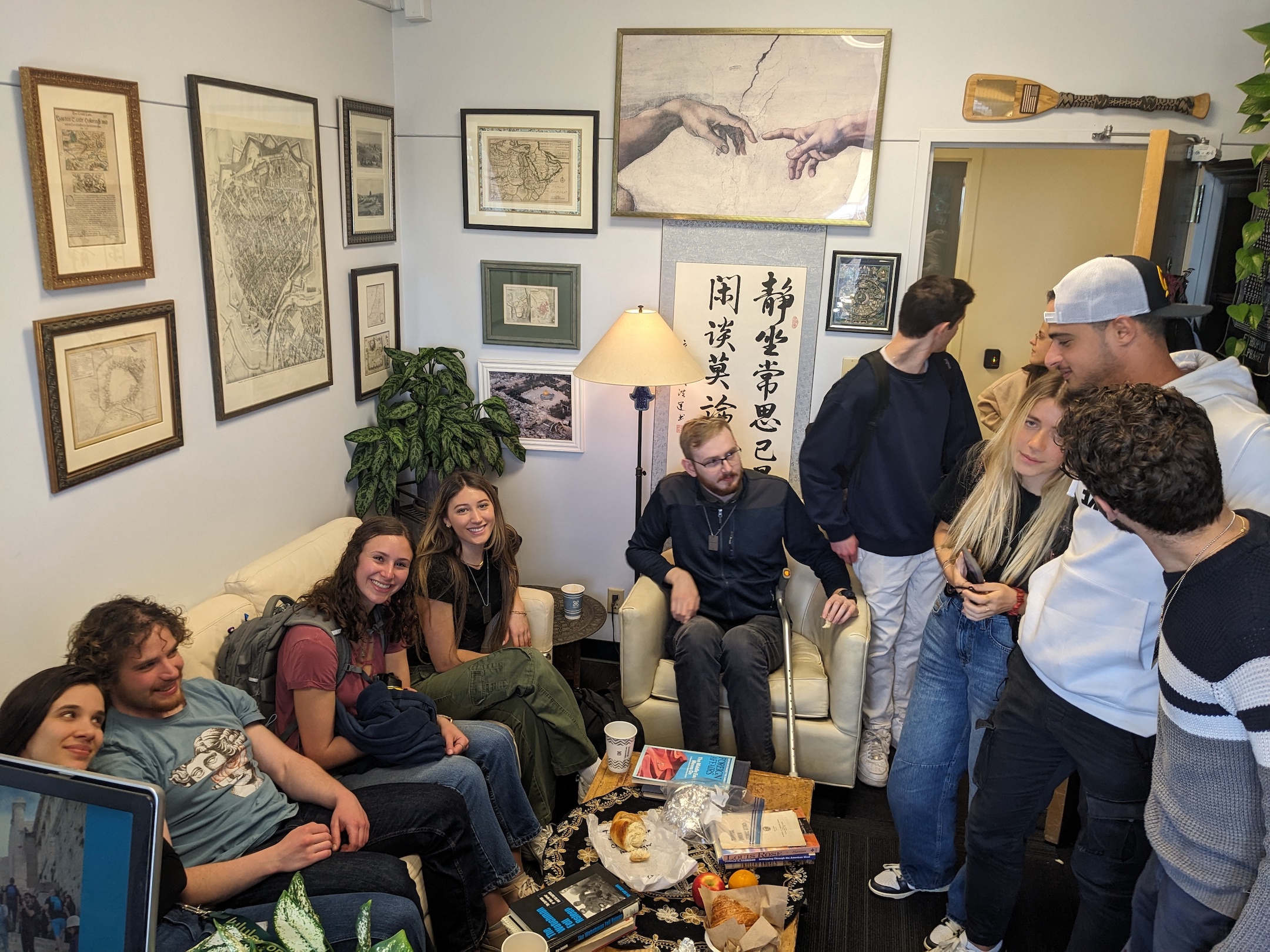
Jewish students crowd into Ron Hassner’s office on the first day of the professor’s sit-in over the University of California, Berkeley’s handling of antisemitism and anti-Israel protests on campus. (Courtesy Hassner)
For now, Hassner says his office is full of good vibes, as students pass through. He also said that he’s planning to keep his light on overnight, to serve as a beacon to Jewish students on campus, communicating to them “that this matters to me.”
And despite his concerns about how Berkeley is handling the current crisis, Hassner insists that the school remains a great place for Jewish students. The Israel Studies program is one of the best-funded in the country, he notes, and there’s both kosher dining and a Jewish museum on campus.
“But then, on occasion,” he said, “awful things happen.”
This article originally appeared on JTA.org.











